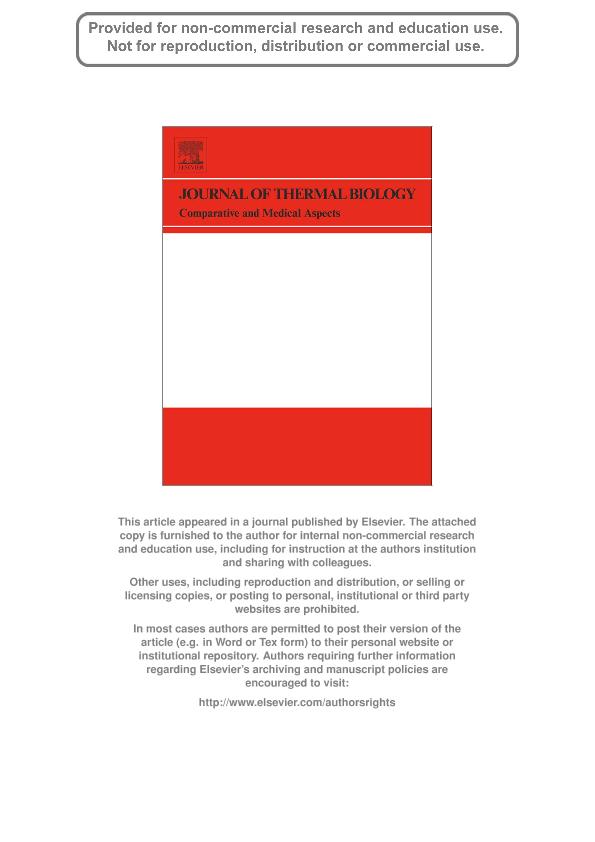Mostrar el registro sencillo del ítem
dc.contributor.author
Superina, Mariella

dc.contributor.author
Jahn, Graciela Alma

dc.date.available
2015-07-23T13:04:21Z
dc.date.issued
2013-03
dc.identifier.citation
Superina, Mariella; Jahn, Graciela Alma; Effect of low-quality diet on torpor frequency and depth in the pichi Zaedyus pichiy (Xenarthra, Dasypodidae), a South American armadillo; Pergamon-Elsevier Science Ltd; Journal of Thermal Biology; 38; 5; 3-2013; 280-285
dc.identifier.issn
0306-4565
dc.identifier.uri
http://hdl.handle.net/11336/1430
dc.description.abstract
Daily torpor is a physiological adaptation that allows mammals to cope with energetic challenges associated with unpredictable periods of food shortage. We experimentally tested whether food quality influences torpor frequency and depth in the pichi (Zaedyus pichiy), a small, opportunistically omnivorous armadillo endemic to arid and semi-arid habitats of southern South America. We recorded body temperature (Tsc) changes in 10 semi-captive, adult female pichis using dataloggers implanted subcutaneously during periods of 21 days. All individuals entered spontaneous daily torpor, but those receiving a low-quality diet had significantly lower daily mean and minimum Tsc, spent more time at Tsc below their individual lower limit of normothermia, and had a higher Heterothermy Index than controls. Five individuals entered prolonged torpor bouts lasting more than 24 hours, two of them repeatedly. Nine out of ten prolonged torpor bouts occurred in individuals feeding on a low-quality diet, suggesting that pichis are able to enter prolonged periods of torpor during severe environmental stress. In combination with their ability to hibernate and to respond to a reduced insect abundance by ingesting other food items, this physiological adaptation allows pichis to better cope with food shortages and a more extreme climate than other armadillos. It may explain why Z. pichiy naturally occurs farther south than any other armadillo species.
dc.format
application/pdf
dc.language.iso
eng
dc.publisher
Pergamon-Elsevier Science Ltd

dc.rights
info:eu-repo/semantics/openAccess
dc.rights.uri
https://creativecommons.org/licenses/by-nc-sa/2.5/ar/
dc.subject
ARGENTINA
dc.subject
CINGULATA
dc.subject
FOOD QUALITY
dc.subject
HYPOMETABOLISM
dc.subject
THERMOREGULATION
dc.subject
TORPOR
dc.subject
XENARTHRA
dc.subject.classification
Zoología, Ornitología, Entomología, Etología

dc.subject.classification
Ciencias Biológicas

dc.subject.classification
CIENCIAS NATURALES Y EXACTAS

dc.title
Effect of low-quality diet on torpor frequency and depth in the pichi Zaedyus pichiy (Xenarthra, Dasypodidae), a South American armadillo
dc.type
info:eu-repo/semantics/article
dc.type
info:ar-repo/semantics/artículo
dc.type
info:eu-repo/semantics/publishedVersion
dc.date.updated
2016-03-30 10:35:44.97925-03
dc.journal.volume
38
dc.journal.number
5
dc.journal.pagination
280-285
dc.journal.pais
Estados Unidos

dc.description.fil
Fil: Superina, Mariella. Consejo Nacional de Investigaciones Científicas y Técnicas. Centro Científico Tecnológico Conicet - Mendoza. Instituto de Medicina y Biología Experimental de Cuyo; Argentina
dc.description.fil
Fil: Jahn, Graciela Alma. Consejo Nacional de Investigaciones Científicas y Técnicas. Centro Científico Tecnológico Conicet - Mendoza. Instituto de Medicina y Biología Experimental de Cuyo; Argentina
dc.journal.title
Journal of Thermal Biology

dc.relation.alternativeid
info:eu-repo/semantics/altIdentifier/doi/http://dx.doi.org/10.1016/j.jtherbio.2013.03.004
Archivos asociados
